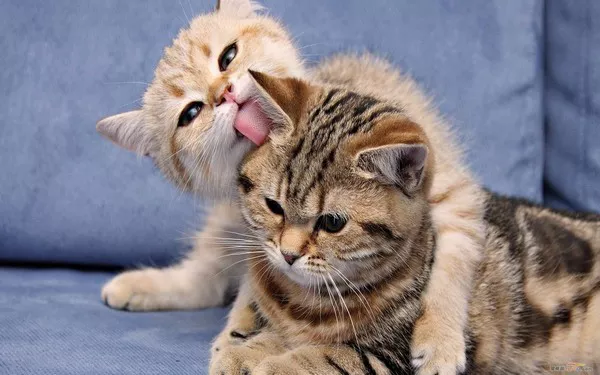The Cornish Rex cat, with its distinctive curly coat, stands out as a playful and sociable breed. Originating from a natural mutation in Cornwall, England, these cats have become popular in the United States. Let’s explore their unique characteristics, care needs, and potential drawbacks.
1. Needy and Demanding Nature
Cornish Rex cats are known for their affectionate temperament. Here’s what you need to know:
Affection Level: High
Cornish Rex cats are often described as velcro cats due to their high need for affection. They thrive on attention and enjoy being in the company of their human family members. While this can be endearing, it also means they may become distressed if left alone for long periods.
Interaction: They love being part of the family and readily engage in play.
Unlike some breeds that are more aloof, Cornish Rex cats actively seek out interaction with their human companions. They enjoy playing games, chasing toys, and even learning tricks. Their playful nature makes them ideal pets for families with children or other pets.
Snuggling: Their soft, curly coat makes them irresistible for lap naps and petting.
One of the most appealing traits of the Cornish Rex is its soft, wavy coat. Many owners find themselves unable to resist cuddling up with their Rex for a cozy nap. However, this close contact can lead to issues with allergies for some individuals.
Vocal Communicators: Some Cornish Rex cats are chatty, likely due to their Siamese heritage.
While not all Cornish Rex cats are vocal, many do enjoy engaging in conversations with their owners. This trait likely stems from their Siamese ancestry, as Siamese cats are known for their vocalizations. While some owners may find this endearing, others may find it excessive, especially if their Rex is prone to loud meowing at all hours of the day and night.
2. Genetic Skin and Coat Disorders
The Cornish Rex’s unusual coat can lead to specific challenges:
Lack of Guard Hairs: Unlike other cats, they lack guard hairs, which can make their coat oily.
The lack of guard hairs in Cornish Rex cats means that their coat lacks the protective layer that most cats have. As a result, their skin can become oily, leading to a greasy texture and an increased risk of skin issues such as acne and folliculitis.
Skin Problems: Dryness, rashes, and other skin issues may occur.
In addition to oily skin, Cornish Rex cats are also prone to dryness and irritation. Their delicate skin can easily become irritated by environmental factors such as harsh weather or exposure to certain grooming products. Owners need to be vigilant in monitoring their Rex’s skin for signs of irritation and seek veterinary care if necessary.
See Also:What Is Special About Cornish Rex?
Regular Grooming: Owners should maintain their coat through regular grooming.
Despite their lack of guard hairs, Cornish Rex cats still require regular grooming to keep their coat in good condition. This includes bathing to remove excess oils and debris, as well as brushing to prevent matting and tangling. Additionally, owners should be mindful of the products they use on their Rex’s skin and coat, opting for gentle, hypoallergenic options whenever possible.
3. Appetite and Obesity Risk
Cornish Rex cats have hearty appetites:
Large Appetite: They enjoy their meals and may overeat if not monitored.
Cornish Rex cats are known for their love of food and may be prone to overeating if given the opportunity. This can lead to weight gain and obesity, which in turn increases the risk of other health problems such as diabetes and joint issues.
Obesity Prevention: Portion control and a balanced diet are essential.
To prevent obesity, owners should monitor their Rex’s food intake and provide portion-controlled meals. It’s important to feed a balanced diet that meets their nutritional needs without excess calories. Additionally, regular exercise is essential for maintaining a healthy weight and keeping their muscles toned.
Health Management: Regular check-ups to prevent weight-related health issues.
Regular veterinary check-ups are crucial for monitoring your Cornish Rex’s weight and overall health. Your vet can provide guidance on diet and exercise and recommend any necessary changes to keep your Rex in optimal health. Early intervention is key to preventing weight-related health issues and ensuring a long and happy life for your furry friend.
Conclusion
Despite their quirks, Cornish Rex cats make delightful companions. Their playful nature and unique appearance add charm to any household. Remember to address their specific needs, and you’ll have a devoted feline friend for up to 20 years. However, it’s essential to be aware of the potential drawbacks of owning a Cornish Rex, including their needy nature, genetic skin and coat disorders, and appetite and obesity risk. With proper care and attention, you can help your Cornish Rex live a happy, healthy life as a beloved member of your family.
Related Topics:

























